Abstract
Fifty four children were studied 1-14 (mean 5.6) years after fabrications of illness had been identified. Thirty of the 54 children were living in families with their biological mothers and 24 were with other family members or in substitute families. Further fabrications were identified for 10 children who had been living with their mothers and there were 'other concerns' for a further eight children. Thirteen children residing with mother and 14 not residing with mother at follow up had a range of disorders including conduct and emotional disorders, and problems related to school, including difficulties in attention and concentration and non-attendance. Overall, 20 children (49% of those successfully followed up) had outcomes that were considered to be unacceptable.
Full text
PDF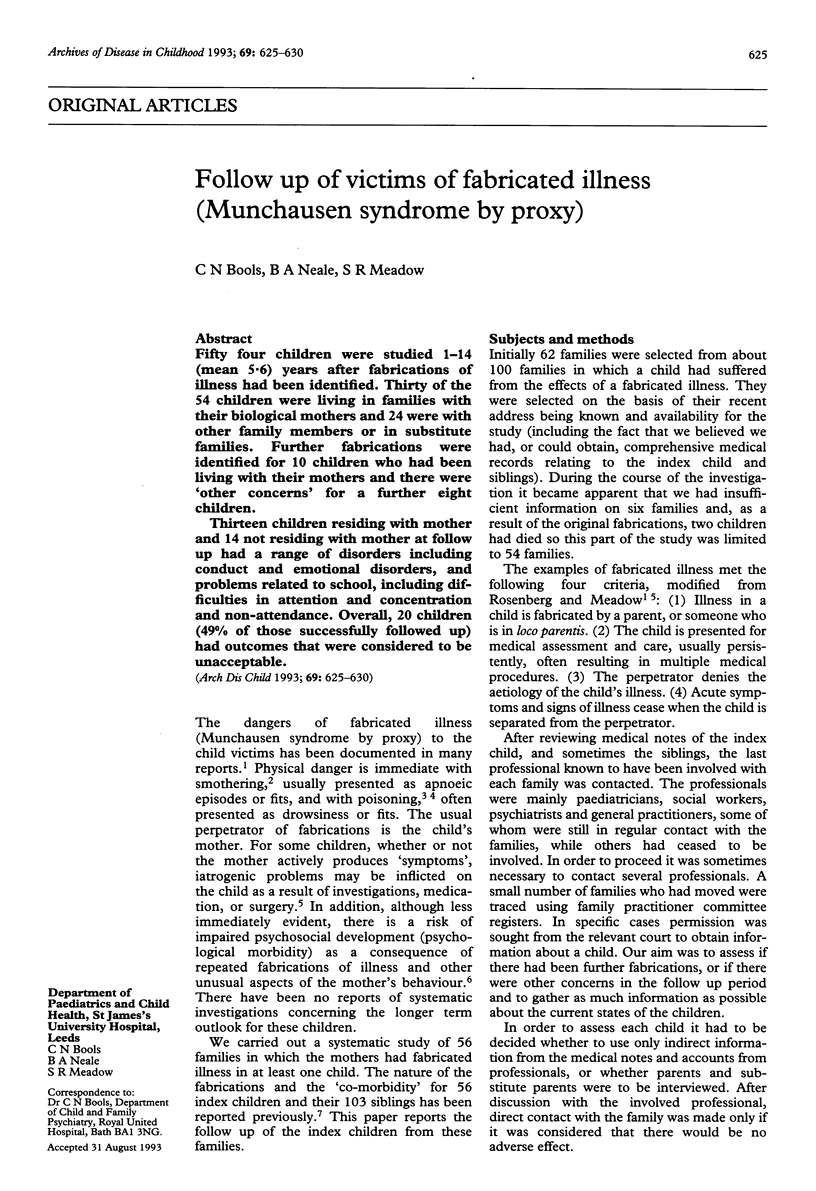
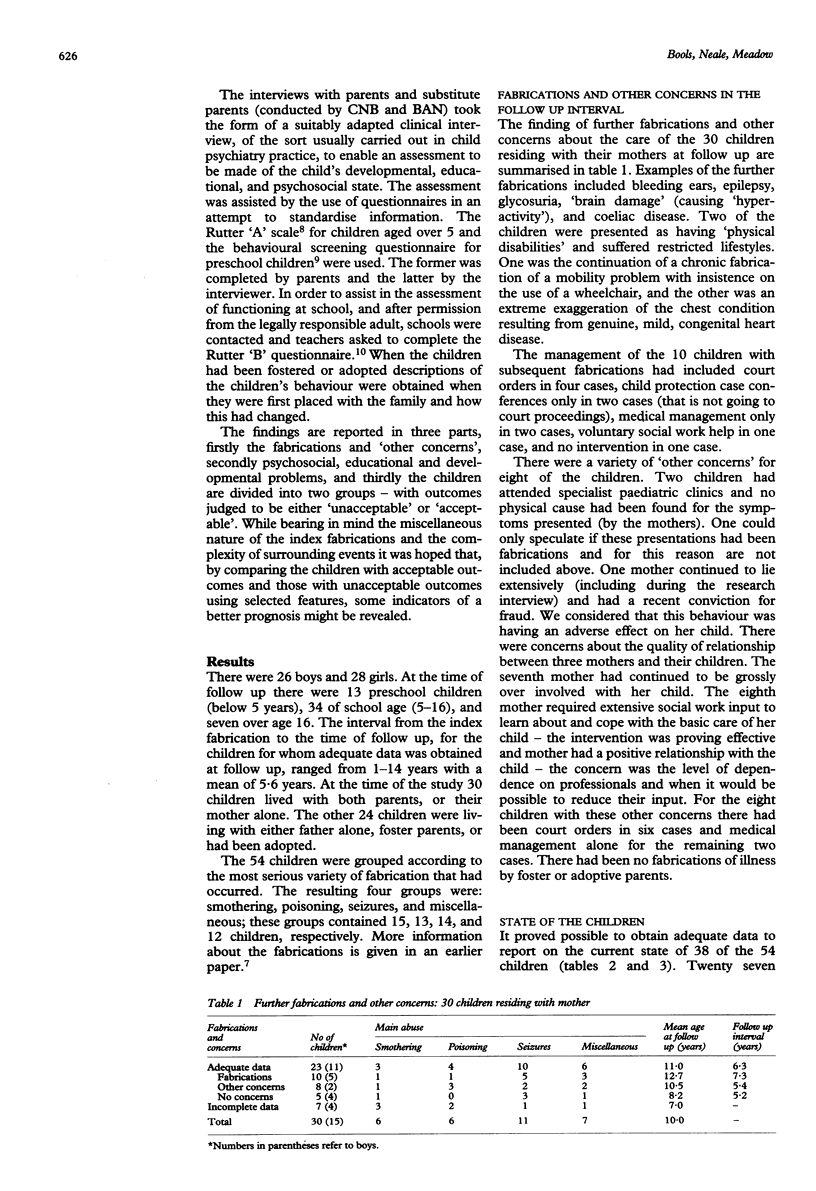
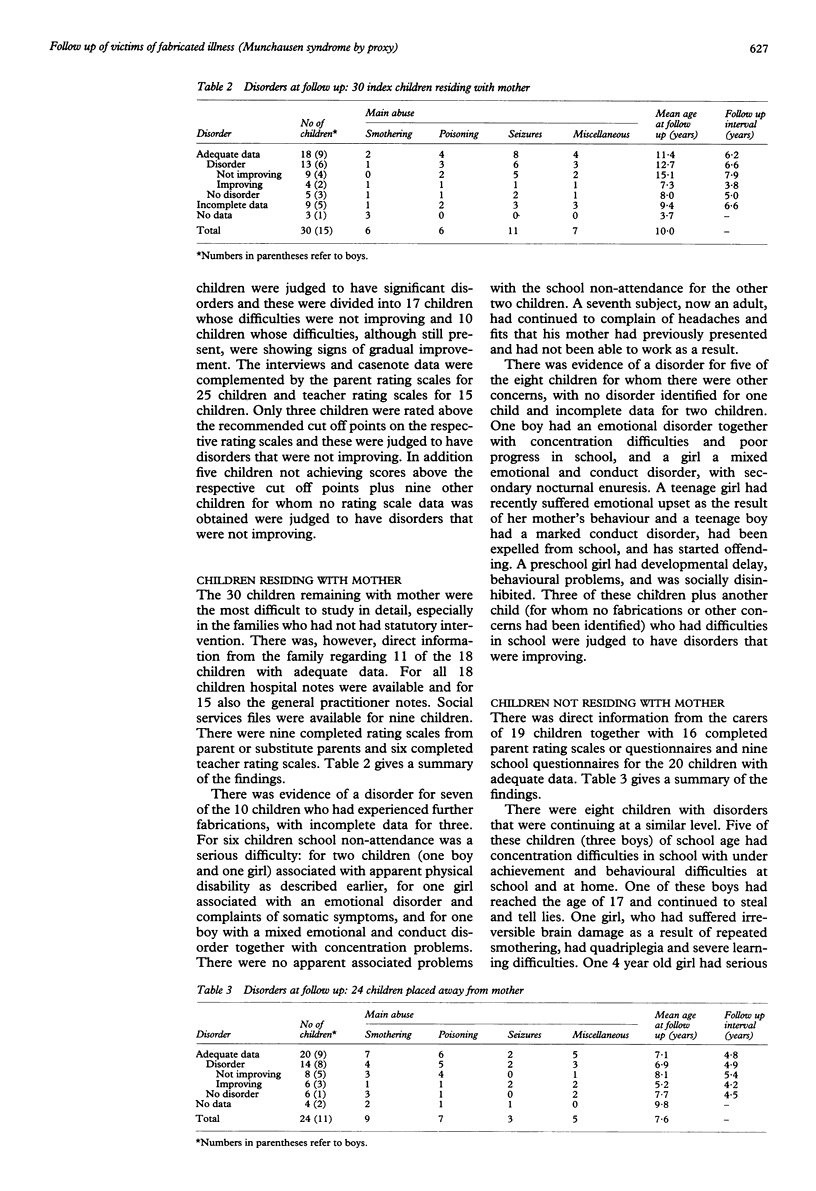
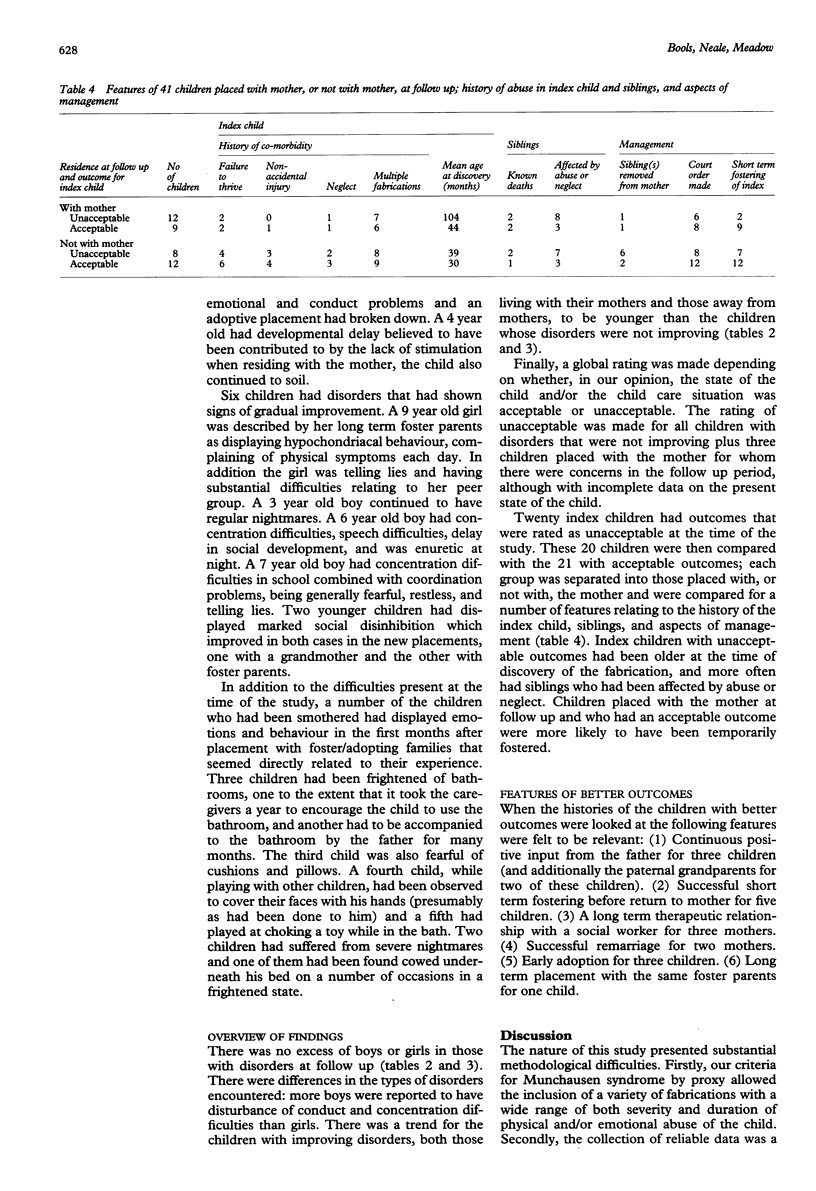
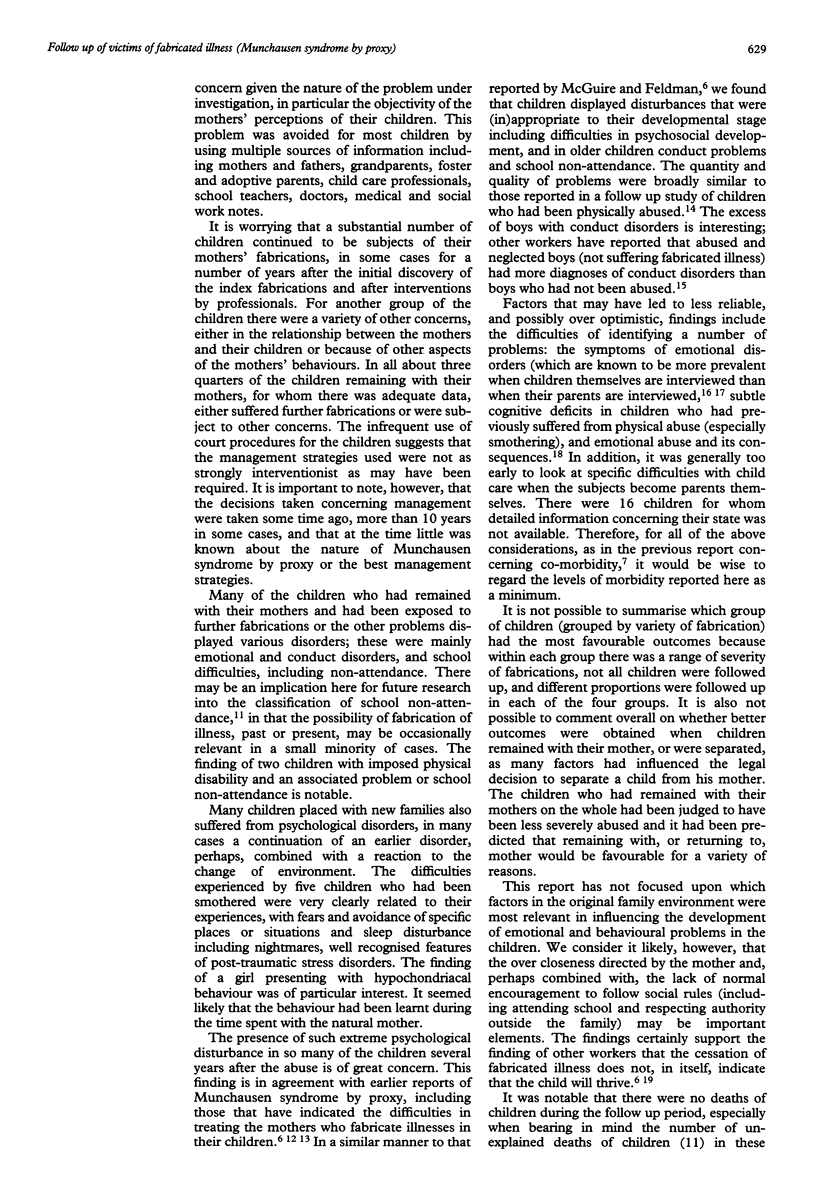
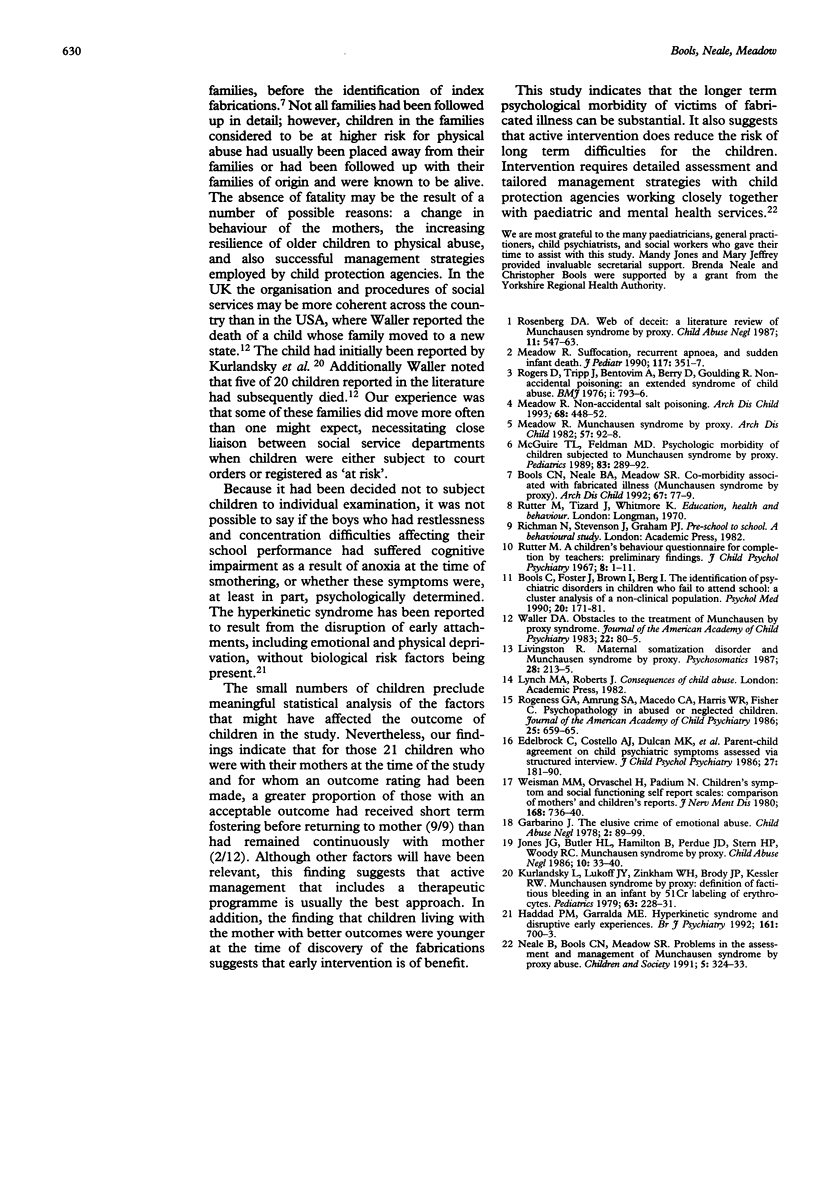
Selected References
These references are in PubMed. This may not be the complete list of references from this article.
- Bools C. N., Neale B. A., Meadow S. R. Co-morbidity associated with fabricated illness (Munchausen syndrome by proxy). Arch Dis Child. 1992 Jan;67(1):77–79. doi: 10.1136/adc.67.1.77. [DOI] [PMC free article] [PubMed] [Google Scholar]
- Bools C., Foster J., Brown I., Berg I. The identification of psychiatric disorders in children who fail to attend school: a cluster analysis of a non-clinical population. Psychol Med. 1990 Feb;20(1):171–181. doi: 10.1017/s0033291700013350. [DOI] [PubMed] [Google Scholar]
- Edelbrock C., Costello A. J., Dulcan M. K., Conover N. C., Kala R. Parent-child agreement on child psychiatric symptoms assessed via structured interview. J Child Psychol Psychiatry. 1986 Mar;27(2):181–190. [PubMed] [Google Scholar]
- Haddad P. M., Garralda M. E. Hyperkinetic syndrome and disruptive early experiences. Br J Psychiatry. 1992 Nov;161:700–703. doi: 10.1192/bjp.161.5.700. [DOI] [PubMed] [Google Scholar]
- Jones J. G., Butler H. L., Hamilton B., Perdue J. D., Stern H. P., Woody R. C. Munchausen syndrome by proxy. Child Abuse Negl. 1986;10(1):33–40. doi: 10.1016/0145-2134(86)90029-3. [DOI] [PubMed] [Google Scholar]
- Kurlandsky L., Lukoff J. Y., Zinkham W. H., Brody J. P., Kessler R. W. Munchausen syndrome by proxy: definition of factitious bleeding in an infant by 51Cr labeling of erythrocytes. Pediatrics. 1979 Feb;63(2):228–231. [PubMed] [Google Scholar]
- Livingston R. Maternal somatization disorder and Munchausen syndrome by proxy. Psychosomatics. 1987 Apr;28(4):213-4, 217. doi: 10.1016/S0033-3182(87)72546-8. [DOI] [PubMed] [Google Scholar]
- McGuire T. L., Feldman K. W. Psychologic morbidity of children subjected to Munchausen syndrome by proxy. Pediatrics. 1989 Feb;83(2):289–292. [PubMed] [Google Scholar]
- Meadow R. Munchausen syndrome by proxy. Arch Dis Child. 1982 Feb;57(2):92–98. doi: 10.1136/adc.57.2.92. [DOI] [PMC free article] [PubMed] [Google Scholar]
- Meadow R. Non-accidental salt poisoning. Arch Dis Child. 1993 Apr;68(4):448–452. doi: 10.1136/adc.68.4.448. [DOI] [PMC free article] [PubMed] [Google Scholar]
- Meadow R. Suffocation, recurrent apnea, and sudden infant death. J Pediatr. 1990 Sep;117(3):351–357. doi: 10.1016/s0022-3476(05)81072-8. [DOI] [PubMed] [Google Scholar]
- Rogeness G. A., Amrung S. A., Macedo C. A., Harris W. R., Fisher C. Psychopathology in abused or neglected children. J Am Acad Child Psychiatry. 1986 Sep;25(5):659–665. doi: 10.1016/s0002-7138(09)60291-0. [DOI] [PubMed] [Google Scholar]
- Rogers D., Tripp J., Bentovim A., Robinson A., Berry D., Goulding R. Papers and originals. Br Med J. 1976 Apr 3;1(6013):793–796. doi: 10.1136/bmj.1.6013.793. [DOI] [PMC free article] [PubMed] [Google Scholar]
- Rosenberg D. A. Web of deceit: a literature review of Munchausen syndrome by proxy. Child Abuse Negl. 1987;11(4):547–563. doi: 10.1016/0145-2134(87)90081-0. [DOI] [PubMed] [Google Scholar]
- Rutter M. A children's behaviour questionnaire for completion by teachers: preliminary findings. J Child Psychol Psychiatry. 1967 May;8(1):1–11. doi: 10.1111/j.1469-7610.1967.tb02175.x. [DOI] [PubMed] [Google Scholar]
- Waller D. A. Obstacles to the treatment of Munchausen by Proxy syndrome. J Am Acad Child Psychiatry. 1983 Jan;22(1):80–85. doi: 10.1097/00004583-198301000-00013. [DOI] [PubMed] [Google Scholar]
- Weissman M. M., Orvaschel H., Padian N. Children's symptom and social functioning self-report scales. Comparison of mothers' and children's reports. J Nerv Ment Dis. 1980 Dec;168(12):736–740. doi: 10.1097/00005053-198012000-00005. [DOI] [PubMed] [Google Scholar]


